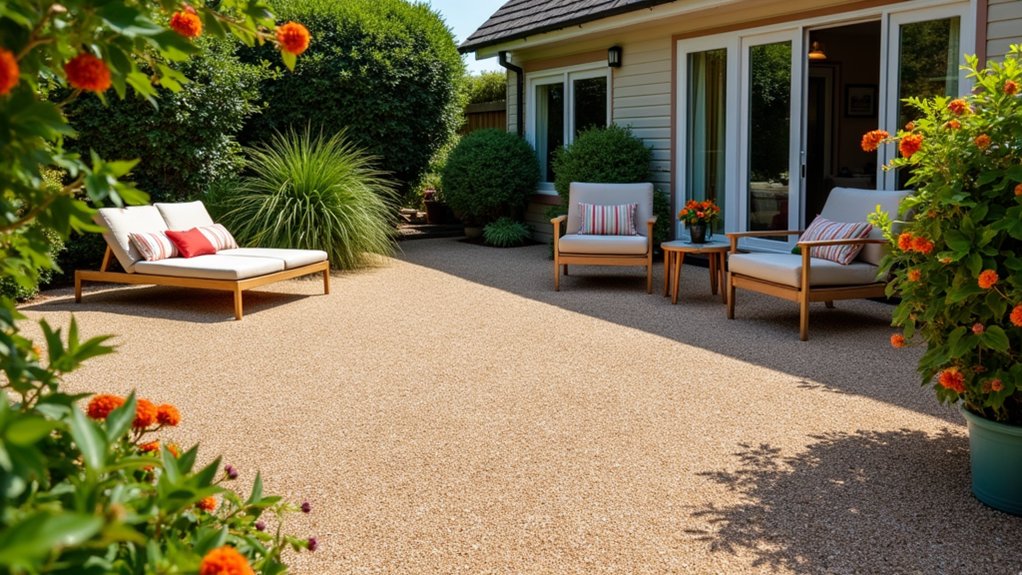Resin-bound gravel stands out as the top patio choice, delivering a smooth, long-lasting surface that handles British weather and daily use brilliantly. Mix and match from dozens of colours and finishes to suit your garden’s style, whilst enjoying built-in grip and proper drainage – essential for our rainy climate. This sustainable option needs little upkeep, making it practical for UK homes. The system transforms patios into attractive, usable spaces that work year-round, from summer BBQs to winter gatherings.
Key Takeaways
Resin-bound gravel stands out as a brilliant choice for British patios, delivering fantastic value for homeowners:
- Built to last 15-30 years, it handles everything from harsh British winters to heavy garden party foot traffic without fuss.
- Creates a smooth, unbroken surface that’s perfect for modern designs – imagine flowing patterns that complement your garden perfectly.
- Tackles our rainy weather brilliantly, allowing water to drain straight through rather than forming puddles like traditional paving.
- Dead easy to maintain – just give it a quick sweep now and then, much simpler than constantly weeding between paving slabs.
- While initially pricier than basic gravel or concrete, it’s a proper investment that boosts your property value and saves money on repairs.
Advantages of Resin-Bound Gravel for Patios
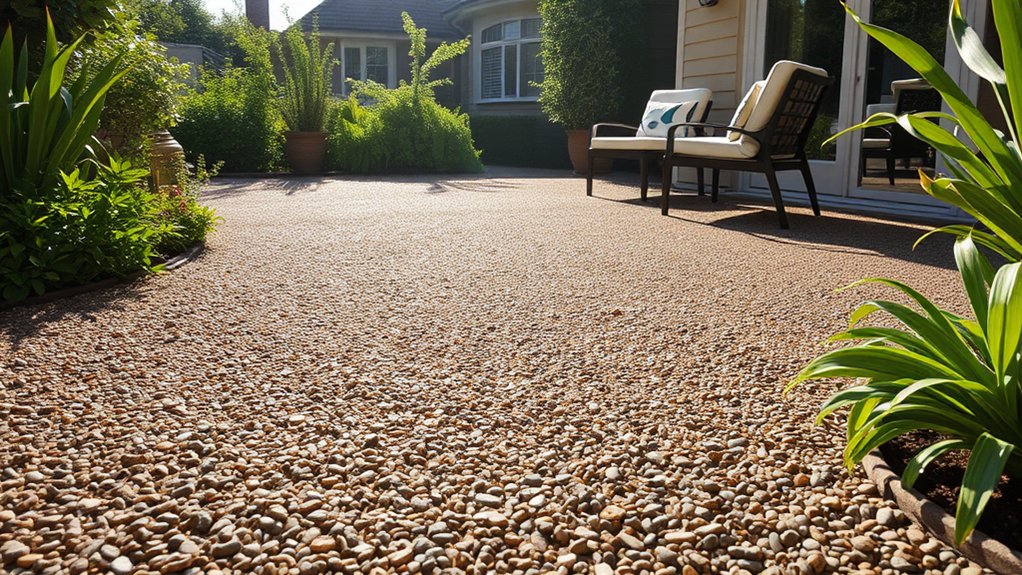
Resin-bound gravel offers a practical and stylish option for your patio.
The surface stands out for its customisation options – you can select from various stone colours and textures to match your home perfectly. Think of it like choosing paint colours, but for your outdoor space. The seamless finish can be tailored to include custom designs such as borders or initials, making your patio unique to your taste. Additionally, the exceptional durability of resin bound patios ensures that they withstand the elements for many years to come.
The smooth, seamless finish looks far smarter than traditional loose gravel or basic concrete. It’s tough enough to handle daily foot traffic, garden furniture and the British weather without cracking or shifting.
The material rarely needs maintenance beyond occasional sweeping, and its permeable nature means rainwater drains away naturally.
For homeowners wanting a reliable, good-looking patio surface that lasts, resin-bound gravel ticks all the boxes.
Permeability and Environmental Benefits
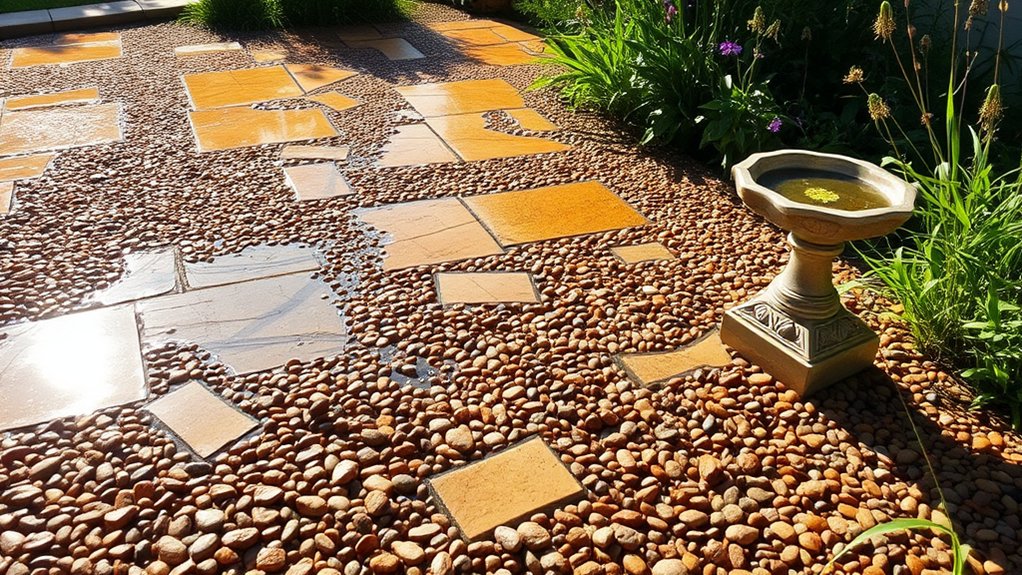
Resin-bound gravel stands out as a highly permeable paving choice for patios, effectively managing rainwater through its porous surface.
The mixture of natural stone and resin creates tiny spaces that let water drain naturally into the ground below. This clever design helps prevent waterlogging and flooding in your garden, whilst reducing pressure on local drainage systems. Additionally, this type of driveway is designed to be eco-friendly, utilizing recycled materials and managing rainwater naturally. Furthermore, the surface is capable of storing up to 3,000 gallons of water under a 1,000-square-foot area, significantly aiding groundwater replenishment.
The surface meets SUDS requirements – the UK standards for sustainable drainage – making it an environmentally sound choice. Much like a natural filter, it helps replenish groundwater and supports the local environment.
Think of it as giving rainwater a proper route back to where it belongs, rather than forcing it into overwhelmed drains.
Given its durability and eco-friendly composition, resin-bound gravel offers both practical benefits and environmental value, making it a smart option for British gardens and driveways.
Resin-Bound Gravel Installation Process
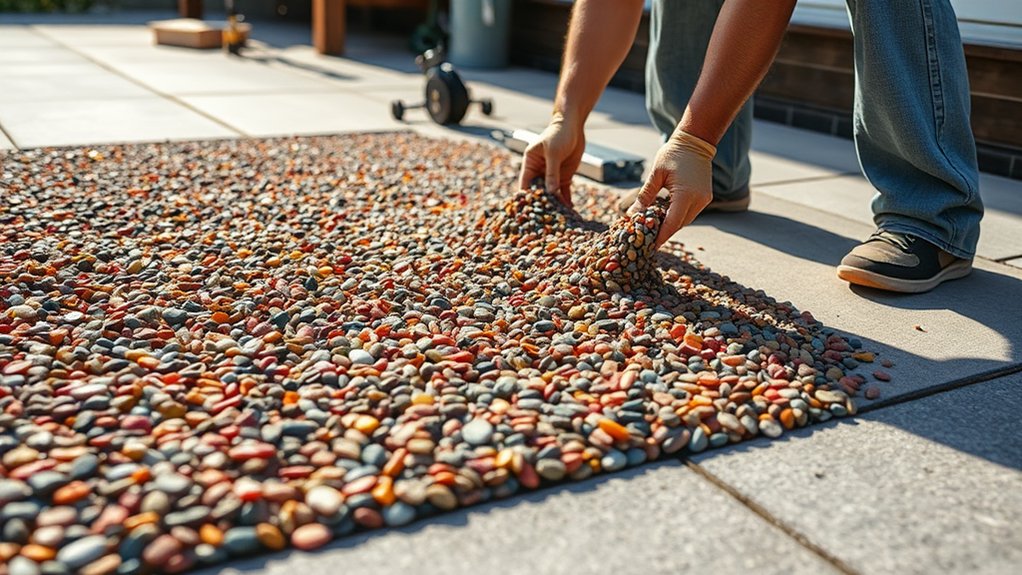
A proper resin-bound gravel installation starts with choosing a solid sub-base, typically concrete or asphalt, which must be clean and primed. Additionally, ensuring a solid base of approximately 220mm deep is key to durability against varying weather conditions.
Mix your resin and hardener thoroughly with a paddle mixer, then gradually add your chosen aggregate to ensure an even blend. Using a whacker plate to tamper surfaces down will also help to create a stable foundation for the installation.
Essential kit includes a trowel for spreading and a wacker plate for compacting. Simply pour the mixture onto your prepared surface, spread it evenly and check for any trapped air.
Leave it to cure according to your product’s guidelines – this bit’s crucial for a lasting finish. The whole process, whilst straightforward, needs careful attention to detail for the best results.
Comparison to Other Patio Materials
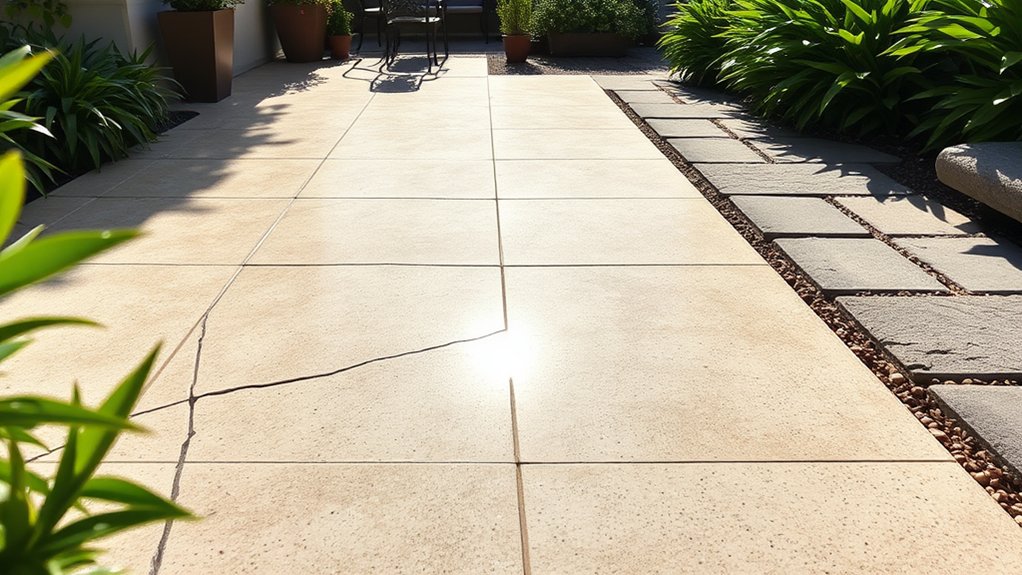
Resin-bound gravel stands apart from traditional patio materials in both looks and practicality. Unlike standard concrete, it offers more design flexibility and a smoother finish.
Whilst traditional paving slabs often cause drainage issues in wet British weather, resin-bound surfaces allow rainwater to drain naturally. The system also proves more reliable than loose gravel, which tends to scatter across gardens and allows weeds to sprout through.
For British homeowners seeking a low-maintenance option that works year-round, resin-bound gravel delivers a stable, durable surface that stays put.
Resin vs. Concrete
Resin-bound gravel and concrete are both popular patio choices, but they differ significantly in key areas.
Resin-bound surfaces offer more flexibility in design, creating a smooth, attractive finish that flows naturally through your garden. The UV-stable resin keeps its colour well, much like a quality garden fence, and you can choose from various stone types to match your home’s style.
Concrete tends to be more troublesome, often developing cracks during British winters and requiring regular sealing to look its best. Think of it like an untreated wooden deck – without proper care, it deteriorates quickly.
Resin-bound surfaces, however, stay solid and need minimal upkeep, even after years of British weather.
For UK homeowners, resin-bound gravel makes more practical sense. It handles our wet climate better, looks smarter longer, and saves time on maintenance – making it the better choice for most garden projects.
Resin vs. Paving Slabs
When choosing your patio material, resin-bound gravel offers distinct benefits over traditional paving slabs.
Resin surfaces can be customised with various colours and stone types to match any garden style. Unlike slabs with their obvious joins, resin creates a smooth, contemporary look that flows naturally.
A major plus is how water drains straight through resin surfaces, preventing puddles that often plague standard paving.
Whilst paving slabs tend to crack, move about and get weedy between joints, resin stays put and needs little upkeep.
It’s tough enough to handle heavy garden furniture and regular foot traffic without losing its looks – particularly useful for British weather conditions.
The surface also resists oil stains, making it practical for areas near cars or BBQs.
Resin vs. Loose Gravel
Resin-bound gravel outperforms loose gravel for patios, offering better stability and looks.
Think of resin as a permanent solution – stones stay put, creating a smooth surface you can walk on confidently, whilst loose gravel tends to scatter about and create mess.
Though loose gravel costs less upfront, you’ll spend more time and money topping it up and levelling it out.
A key advantage of resin-bound surfaces is their drainage capability – rainwater seeps through naturally, meeting UK SUDS requirements for proper drainage.
Loose gravel simply can’t match this.
For British homeowners looking to invest wisely in their outdoor space, resin-bound gravel delivers lasting value, combining practicality with kerb appeal.
Aesthetic and Functional Features
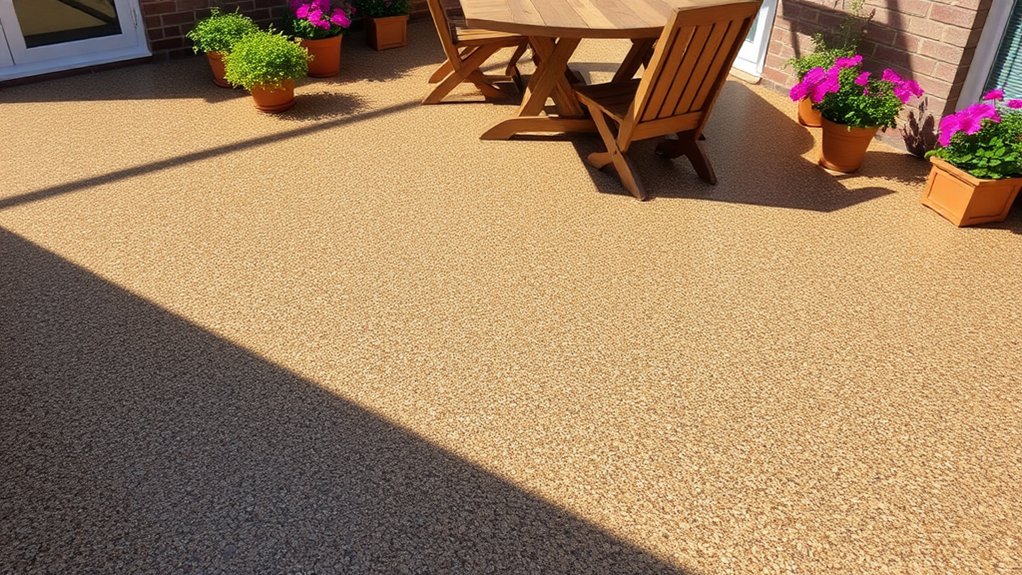
Resin-bound gravel offers both style and practicality for outdoor spaces. The material gives you plenty of design options, perfect for creating distinctive patios that match your taste. Choose from a wide range of colours to suit your property, from subtle stone shades to bold modern tones.
Different textures allow you to add your personal touch, making each installation unique.
The practical benefits are equally impressive. The surface is long-lasting and naturally slip-resistant – ideal for British weather. Its permeable nature handles heavy rainfall effectively, preventing puddles and flooding.
Unlike traditional paving, it needs little upkeep beyond occasional sweeping and washing.
For UK homeowners looking to enhance their gardens or driveways, resin-bound gravel strikes an excellent balance between looks and functionality.
Long-Term Value and Lifespan
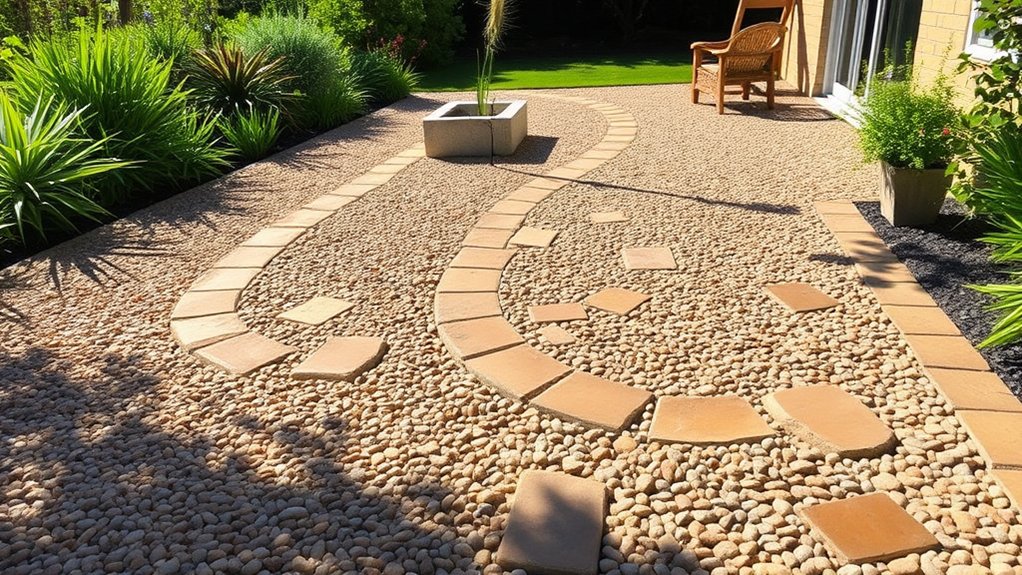
Resin-bound Gravel: Value for Money and Longevity
Resin-bound gravel surfaces deliver exceptional value, lasting 15 to 30 years whilst maintaining their quality.
Whether for driveways or garden paths, this surface withstands British weather and regular use, boosting your property’s market value.
Key advantages:
- Built to Last: Handles daily wear without deteriorating
- Cost-Effective: Reduces need for frequent replacement
- Minimal Upkeep: Prevents weed growth, requires little repair
- Drainage Benefits: Allows rainwater to soak through naturally
Perfect for homeowners seeking a practical, long-term investment that looks smart year after year.
Frequently Asked Questions
Can Resin-Bound Gravel Be Installed Over Existing Surfaces?
Yes, resin-bound gravel works brilliantly over existing surfaces, provided they’re in good nick. Common bases include concrete driveways and tarmac paths – they just need to be stable and crack-free. It’s a popular choice for UK homeowners looking to refresh their outdoor spaces without the faff of ripping up the old surface. The process saves both time and money whilst delivering a smart, durable finish that’ll handle our British weather.
How Does Temperature Affect the Installation Process?
Temperature plays a crucial role in resin-bound gravel installation, much like following the right conditions when setting concrete. Installation works best between 5°C and 25°C. Higher temperatures speed up curing times, requiring faster application, whilst colder conditions slow the process and may prevent proper bonding. For optimal results, installers should check weather forecasts and plan accordingly.
Are There Specific Cleaning Products Recommended for Resin-Bound Patios?
Regular washing with pH-neutral, biodegradable cleaners works best for resin-bound patios. Products like Stontex Green Clean or Kamox effectively tackle stubborn algae and general dirt. Give the surface a good sweep before washing, and avoid harsh chemicals that might damage the resin. A pressure washer on low setting does the job nicely for routine cleaning.
Can Resin-Bound Gravel Be Repaired if Damaged?
Resin-bound gravel can indeed be repaired if damaged. Standard fixes include applying fresh resin binder to cracked areas, re-securing loose stones, and using a heat gun to blend repairs with the existing surface. Most small repairs are straightforward DIY jobs, whilst larger damage might need professional attention to ensure a proper match with your existing driveway or path.
What Colors and Textures Are Available for Resin-Bound Gravel?
A wide range of colours and textures are available for resin-bound gravel, from classic buff and grey tones to rich earth browns and striking blacks. Common colour choices include Yorkshire Cream, Thames Valley Grey and Cotswold Stone, whilst texture options vary from fine aggregate to larger stones. Each blend can be customised to complement your property’s existing features and surroundings.
Conclusion
Traditional patio materials simply can’t match the benefits of resin-bound gravel. It’s a practical, durable solution that combines environmental friendliness with stunning aesthetics. The system offers excellent value for money, featuring straightforward installation and minimal maintenance needs. For British homeowners seeking a reliable patio surface that stands up to our varied weather, resin-bound gravel is the smart choice.
